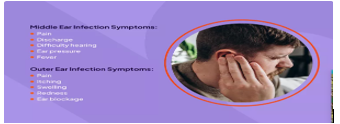While some respiratory diseases such as pneumonia, asthma and allergies are well-defined in the popular imagination, colds, sinusitis and allergic rhinitis have inflammation of the airways in which it is easy to become confused. Let’s find out the differences of these diseases.
What is the difference between colds, sinusitis and allergic rhinitis?
The common cold is a viral infection (so is contracted through direct or indirect contagion with another infected person), which affects the nose, throat and airways; It is very common and usually resolves in one or two weeks; It can also be a manifestation of the influence.
The sinusitis, however, is a sinus infection which can be acute or chronic, and that occurs when the sinuses become swollen and inflamed. Sinusitis is usually caused by a virus, and often persists even after other respiratory symptoms resolved. In rare cases, fungi or bacteria can cause an infection of the sinus. Even allergies, nasal polyps, infections to the teeth, or a deviated septum can trigger sinusitis.
Finally, the allergic rhinitis, also called hay fever, occurs when the immune system overreacts to particles in the air that is breathed, (if within them is present an allergen to which it is sensitive). The immune system then causes symptoms such as sneezing and runny nose. The particles are called allergens, which means that they can cause an allergic reaction.

Colds, sinusitis and rhinitis have different symptoms?
Sometimes they confuse colds, sinusitis and allergic rhinitis, but also from the symptoms you can recognize what it is.
The symptoms of a cold usually develop within a few days after contracting the infection; among the most common we are …
- Sore throat
- Stuffy or runny
- Sneezing
- Cough
- Hoarse voice
- General feeling of malaise
While among the symptoms less common are:
- Fever between 37°C and 39°C
- Headache
- Earache (otitis possible)
- Muscular pain
- Loss of taste and smell
- Mild eye irritation
- Feeling of pressure in the ears
The symptoms are usually at their peak during the first two or three days, then gradually start to improve. In adults and older children, usually they last about 7 to 10 days, but can last longer. The cough, in particular, can last for two or three weeks.
Sometimes it can be hard to tell if you are suffering from colds or something that is potentially more serious, such as sinusitis or allergic rhinitis, since the symptoms can be very similar. The differences are important, for symptoms of sinusitis …
- Pain up front (frontal sinusitis)
- Pain above and below the eyes and behind the nose
- Sore particularly strong head
- Greenish-yellow mucus
- Burning throat
As for allergic rhinitis (not to be confused with chronic rhinitis), symptoms may develop within minutes or hours after you breathe in an allergen and can last for days. The symptoms often start when you breathe in an allergen include:
- Sneezing frequently, especially on waking.
- Running nose
- Tickling in the throat or cough caused by dripping
- Watery eyes, itchy eyes
- Itching in the ears, nose and throat
- Allergic cough
Diagnosis of respiratory allergies: Skin prick tests
In case of respiratory allergies, a very useful method to verify it is the skin prick test, which runs through the positioning of a drop of the allergen on the skin, on which is made to penetrate a needle. In this way, the allergen rapidly enters the body, allowing to observe if there is an allergic reaction or less over a quarter of an hour.
Colds: Remedies
The colds are usually mild and of short duration, then, usually, there is no need to consult your doctor; you should just stay at home and use pain killers and other remedies to relieve the symptoms, until it feels better. Unlike the case of the common cold in the newborn, which is monitored constantly, as small children, being more fragile, are more prone to complications or rapid deterioration of the airways in more serious conditions.
It is necessary, for adults, go to the doctor if:
- The symptoms persist for more than three weeks
- Symptoms suddenly get worse
- Breathing difficulties arise
- Cough has a blood-stained sputum mucus
Sinusitis: Remedies
In case of sinusitis, a nasal decongestant can help relieve the symptoms; not recommended for continuous use for more than 10 days, because it may worsen the symptoms of sinusitis. Sometimes it may also be effective a nasal spray steroid, but also in this case should not abuse it, worth a worsening of sinusitis.
The antibiotics, such as amoxicillin, are only used for chronic sinusitis, but you always need to be prescribed by the doctor.
Allergic rhinitis: Remedies
It is above all important to avoid the allergens that cause allergic rhinitis: only in this way can reduce symptoms without resorting to drugs.
The antihistamines can help relieve some allergy symptoms, when it cannot help but get in touch with the disturbing allergen.
Also take into consideration with the allergist immunotherapy: it can be very useful in case of allergic rhinitis and other allergic symptoms recurring.



